| Gemstone Chart |
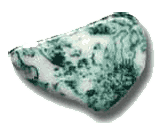 Natural Agate Natural Agate
Agate is a beautiful natural chalcedony stone, classified as a semi precious gem and has been used by people as early as the ancient Egyptians in and before 3000 BC! Agate is hard and tough enough to be incorporated into jewelry and other ornamental items.
Color: Blue, green, yellow,orange, brown, gray
Categories: semi-precious stone
Chemical Composition: SiO2
Crystal Group: Hexagonal
Refractive Index: 1.530 - 1.539
Hardness: 6.5 - 7
Density: 2.57 - 2.64
Occurrence: Scotland, U.S.A., India, England, Italy, Brazil, Uruguay, Germany, Egypt, Indonesia, and many other localities.
|  Natural Chalcedony Natural Chalcedony
Chalcedony is a catch all term that includes many well known varieties of cryptocrystalline quartz gemstones. They are found in all 50 States, in many colors and color combinations, and in sedimentary, igneous, and metamorphic rocks.
Color: grayish, purple, white, green, blue, lavender, yellow, brown
Categories: semi-precious stone
Chemical Composition: SiO2
Crystal Group: Hexagonal
Refractive Index: 1.530 - 1.539
Hardness: 6.5
Density: 2.57 – 2.64
Occurrence: Brazil, U.S.A. Germany, India, Uruguay, Austarlia, Egypt, Italy, Scotland, South Africa, Namibia, Madagascar, Mexico, Tanzania, and many other localities throughout the world.
| 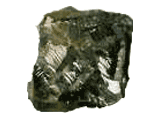 Natural Diamond Natural Diamond
Diamond is the ultimate gemstone, having few weaknesses and many strengths. It is well known that Diamond is the hardest substance found in nature.
Color: White, yellow, brown, black. Rarely, blue, red, or pink.
Categories: precious stone
Chemical Composition: C
Crystal Group: Cubic
Refractive Index: 2.417
Hardness: 10
Density: 3.52
Occurrence: Africa, Russia, Canada, Australia, India
| 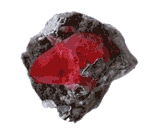 Natural Rhodochrosite Natural Rhodochrosite
Rhodochrosite is a manganese carbonate mineral with chemical composition MnCO3. The pink color of rhodochrosite is caused by the element manganese and it is formed when manganese is dissolved by ground water and combines with a carbonate material and then drips off the ceiling of caves and crevices deep underground.Rhodochrosite often forms pink and white bands. It is often carved into figurines or boxes while the tubular stalactite formations are often sliced for use in jewelry. Fine gem quality crystals are sometimes cut into gemstones for use in high end jewelry, but the more common grade is used extensively in silver and gold jewelry.
Color: Rose red, raspberry red, pink, grey, fawn, brown
Categories: semi-precious stone
Chemical Composition: MnCO3
Crystal Group: Trigonal
Refractive Index: 1.600 – 1.820
Hardness: 4
Density: 3.45 – 3.70
Occurrence: Argentina; Colorado, U.S.A.; Romania; Hungary; India; South Africa; Saxony, Chile; Peru; Mexico.
| 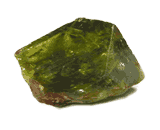 Natural Sphene Natural Sphene
Sphene is also known as calcium titanium silicate.It is named from the greek word for wedge, because of its typical wedge shaped crystal habit.Because of it's high dispersion and refractive index, a well cut sphene can display stunning brilliance. Sphene is somewhat soft and as a result is more suitable as a pendant than as a ring stone. Sphene is rarely very clean.
Color: Green, yellow. brown
Categories: semi-precious stone
Chemical Composition: CaTiSiO5
Crystal Group: Monoclinic
Refractive Index: (1.885-1.990,)-(1.915-2.050)
Hardness: 5.5
Density: 3.52-3.54
Occurrence: Austria, Dheirene-Madagascar, India, USA, Brazil.
| 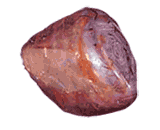 Natural Star Sapphire Natural Star Sapphire
A star sapphire is a lovely gem that exhibits a six pointed star because of the intersection of six thin intersecting inclusions. When the gem is lit from above, the inclusions become quite visible and the star shape appears.A powdery grey-blue star sapphire is the centerpiece of a ring from the Art Deco period.
Color: Blue, green blue, violet, blue, black, brown, pink.
Categories: semi-precious stone
Chemical Composition: AL2O3
Crystal Group: Hexagonal
Refractive Index: 1.759-1.778
Hardness: 9
Density: 4
Occurrence: Sri Lanka, Burma, India, East Africa, Ankarana-Madagascar, Thailand.
| 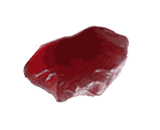 Natural Sunstone Natural Sunstone
Sunstone is a sodium-calcium-aluminum-silicate variety of plagioclase feldspar, which when viewed from certain directions exhibits a brilliant spangled appearance; this has led to its use as a gemstone.
Color: Orange-red, brownish-red
Categories: semi-precious stone
Chemical Composition: NaAlSi3O8
Crystal Group: Triclinic
Refractive Index: RI 1.54 –1.55
Hardness: 6
Density: SG 2.62 – 2.65
Occurrence: Near Lake Baikal Russia; East Africa; Hastings, Renfrew, and Haliburton, in Ontario Canada; Tvedestrand, Hitero, Norway; Kangayam, India; Maine, Oregon, New Mexico, California, and North Carolina, USA.
|
|
